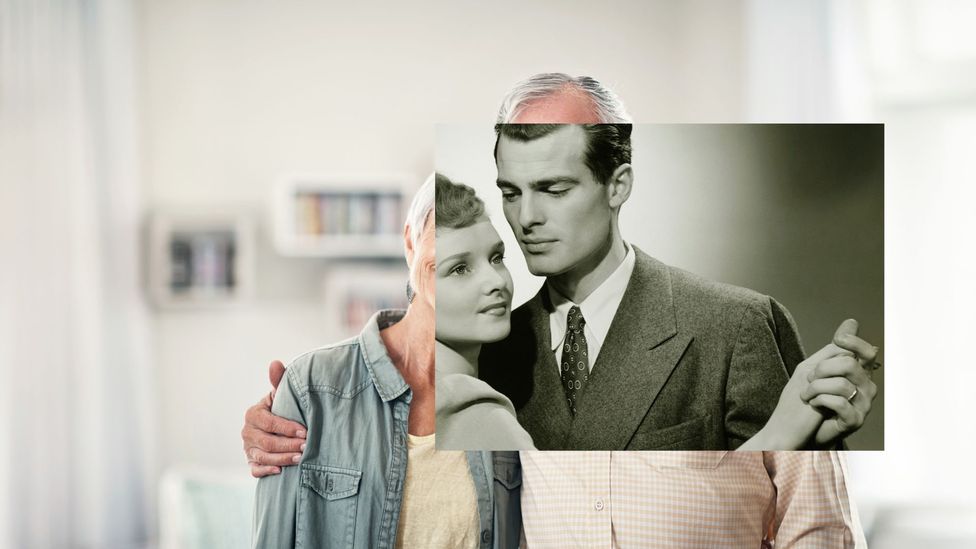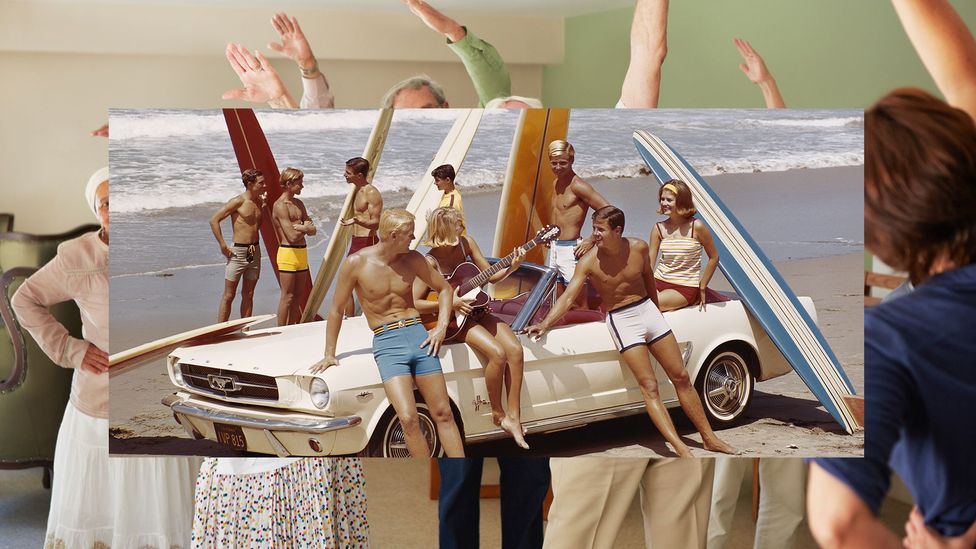Be With Someone Who Makes You Feel Young Again
The age you lot feel means more than your actual birthdate
(Image credit:
Javier Hirschfeld/Getty Images
)

Most people feel younger or older than they really are – and this 'subjective age' has a big consequence on their physical and mental health.
I
Imagine, for a moment, that you had no birth document and your age was but based on the way yous feel within. How old would you say you are?
Similar your pinnacle or shoe size, the number of years that accept passed since yous offset entered the globe is an unchangeable fact. Just everyday experience suggests that we often don't experience ageing the same way, with many people feeling older or younger than they really are.
Scientists are increasingly interested in this quality. They are finding that your 'subjective age' may be essential for understanding the reasons that some people appear to flourish as they historic period – while others fade. "The extent to which older adults feel much younger than they are may determine important daily or life decisions for what they will practise next," says Brian Nosek at the University of Virginia.
You might as well like:
- What'due south the prime of your life?
- The ultra-athletes aged 60+
- The amazing fertility of the older heed
Its importance doesn't end there. Various studies have even shown that your subjective historic period also tin can predict various important health outcomes, including your chance of death. In some very real ways, you really are 'but as one-time as you experience'.
Given these enticing results, many researchers are now trying to unpick the many biological, psychological, and social factors that shape the individual experience of ageing – and how this cognition might help us live longer, healthier lives.

Later on their mid-20s, well-nigh people feel younger than their truthful age (Credit: Javier Hirschfeld/Getty Images)
This new understanding of the ageing process has been decades in the making. Some of the earliest studies charting the gap between felt and chronological age appeared in the 1970s and 1980s. That trickle of initial interest has now turned into a flood. A torrent of new studies during the last 10 years accept explored the potential psychological and physiological consequences of this discrepancy.
One of the most intriguing strands of this research has explored the manner subjective age interacts with our personality. It is now well accepted that people tend to mellow as they get older, becoming less extroverted and less open to new experiences – personality changes which are less pronounced in people who are younger at eye and accentuated in people with older subjective ages.
Interestingly, all the same, the people with younger subjective ages also became more careful and less neurotic – positive changes that come with normal ageing. So they still seem to gain the wisdom that comes with greater life experience. But it doesn't come up at the cost of the energy and exuberance of youth. Information technology'due south not as if having a lower subjective historic period leaves us frozen in a state of permanent immaturity.
Feeling younger than your years besides seems to come with a lower chance of depression and greater mental wellbeing as we age. It as well means improve physical health, including your risk of dementia, and less of a hazard that you lot will be hospitalised for illness.
Yannick Stephan at the University of Montpellier examined the data from iii longitudinal studies which together tracked more than 17,000 middle-aged and elderly participants.
Near people felt about eight years younger than their actual chronological age. But some felt they had anile – and the consequences were serious. Feeling betwixt 8 and 13 years older than your actual age resulted in an 18-25% greater gamble of death over the study periods, and greater illness burden – even when you command for other demographic factors such every bit education, race or marital status.

As they get older, people with a younger subjective age are less probable to develop dementia and they even have a reduced risk of bloodshed (Credit: Javier Hirschfeld/Getty Images)
There are many reasons why subjective age tells u.s.a. so much about our health. It may be a direct result of those accompanying personality changes, with a lower subjective age meaning that y'all bask a greater range of activities (such as travelling or learning a new hobby) as y'all age. "Studies have found, for instance, that subjective age is predictive of physical activity patterns," Stephan says.
But the mechanism linking physical and mental wellbeing to subjective age most certainly acts in both directions. If you feel depressed, forgetful, and physically vulnerable, y'all are likely to feel older. The outcome could be a vicious cycle, with psychological and physiological factors both contributing to a college subjective age and worse wellness, which makes us feel even older and more vulnerable.
Stephan'southward analysis, which is now in printing in the journal of Psychosomatic Medicine, is the largest study of the effect of subjective age on mortality to appointment. These large consequence sizes demand close attention. "These associations are comparable or stronger than the contribution of chronological historic period," says Stephan.
Put some other fashion: your subjective age tin amend predict your wellness than the date on your nascency document.

People with a lower subjective historic period tend to testify positive personality growth, marrying the energy of youth with greater self-control (Credit: Javier Hirschfeld/Getty Images)
With this in listen, many scientists are trying to identify the social and psychological factors that may shape this circuitous process. When do we start to feel that our minds and bodies are operating on different timescales? And why does information technology happen?
Working with Nicole Lindner (as well at the University of Virginia), Nosek has investigated the ways the discrepancy between subjective and chronological historic period evolves across the lifetime. Equally y'all might expect, most children and adolescents feel older than they really are. But this switches at effectually 25, when the felt age drops behind the chronological historic period. By age 30, around seventy% of people feel younger than they really are. And this discrepancy only grows over time. As Nosek and Lindner put it in their paper, "Subjective ageing appears to occur on Mars, where one World decade equals just 5.3 Martian years."
Lindner and Nosek likewise measured the "desired age" of their participants – which, to their surprise, also followed Martian time. "It keeps going up with united states of america, and at but a slightly slower rate than how nosotros feel right at present," Nosek said. This would seem to "support the idea that nosotros experience our life experiences as continuously getting better, simply a fleck more slowly than our actual experiences," he says. It'due south not as if at that place is one single peak age. Again, this flip occurs in our mid-20s: 60% of xx-year-olds want to be older. Only by the age 26, 70% would prefer to be younger, and from then on, well-nigh people view the recent past with the rosiest spectacles.

Health interventions may be more than effective if they take people's subjective age into account, by priming them to experience younger inside (Credit: Javier Hirschfeld/Getty Images)
Some psychologists have speculated that a lower subjective historic period is a form of self-defence force, protecting u.s.a. from the negative age stereotypes – equally seen in a nuanced study past Anna Kornadt at Bielefeld University in Germany.
Kornadt's study hinged on the idea that people's subjective historic period might exist a multifaceted thing that varies in unlike domains. You may feel differently when yous call up virtually yourself at work compared with when you think about your social relationships, for example. And so Kornadt asked participants to say whether they felt younger or older than they actually were in different areas of life.
Sure enough, she found that people'southward subjective ages were lower when negative age stereotypes are well-nigh prevalent – such as work, health and finance – which would seem to back up the idea that this thinking helps people distance themselves from the negative connotations of their historic period-grouping. Believing "I may be 65 simply I but feel 50" would mean you are less worried about your operation at work, for instance. Kornadt as well found that people with a lower subjective age tended to imagine their hereafter self in a more positive light.
Past protecting u.s. from our society's dismal view of ageing and giving us a more optimistic view of our futurity, this self-defence could, in turn, further explicate some of the health benefits of feeling younger than you really are.

Many people may experience a lower subjective age to assistance protect themselves from negative stereotypes most older people (Credit: Javier Hirschfeld/Getty Images)
Despite these advances, scientists are only getting to grips with their potential implications, though it is certainly possible that future interventions might attempt to reduce participants' subjective historic period and improve their health as a result. In one of the few existing studies, elderly participants in a fitness authorities enjoyed greater strength gains if the experimenters praised their functioning relative to other people of their age.
And given its predictive power – beyond our actual chronological age – Stephan believes that doctors should exist asking all their patients about their subjective age to identify the people who are most at chance of future health bug to programme their existing wellness care more than effectively.
In the meantime, these findings can give the states all a more nuanced view of the manner our own brains and bodies weather condition the passing of time. However old you really are, it's worth questioning whether any of those limitations are coming from within.
--
David Robson is a science writer based in London, UK. He is d_a_robson on Twitter.
Join 900,000+ Future fans past liking the states on Facebook, or follow u.s.a. on Twitter or Instagram.
If you liked this story, sign up for the weekly bbc.com features newsletter, called "If You Merely Read vi Things This Week". A handpicked selection of stories from BBC Future, Civilization, Capital, and Travel, delivered to your inbox every Friday.
Source: https://www.bbc.com/future/article/20180712-the-age-you-feel-means-more-than-your-actual-birthdate
0 Response to "Be With Someone Who Makes You Feel Young Again"
Post a Comment